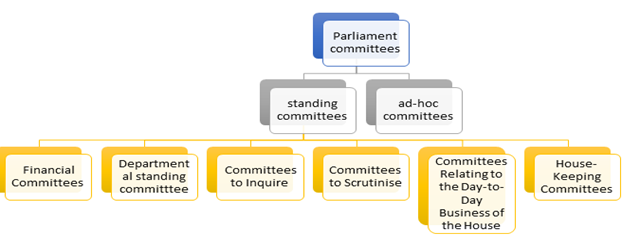In News:
- Recently, the government has revamped the Standing Committees of Parliament.
- Of the 22 committees announced, the Congress has the post of chairperson in only one, and the second largest opposition party, Trinamool Congress, none.
- The ruling BJP has the chairmanship of the important committees on Home, Finance, IT, Defence and External Affairs.
- As a result, many analysts believe this revamp could potentially worsen the relations between the government and opposition parties.
What’s in today’s article:
- Committees of Parliament – About, significance, various committees, features, significance of recommendations of these committees
Committees of Parliament
- A Parliamentary Committee is a panel of MPs that is appointed or elected by the House or nominated by the Speaker.
- It works under the direction of the Speaker and presents its report to the House or to the Speaker.
- Parliamentary Committees have their origins in the British Parliament. They draw their authority from:
- Article 105, which deals with the privileges of MPs, and
- Article 118, which gives Parliament authority to make rules to regulate its procedure and conduct of business.
Significance
- Limited time for discussion in Parliament
- The process of law-making is often complex, and Parliament has limited time for detailed discussions.
- Also, the political polarisation and shrinking middle ground has been leading to increasing disruptions and inconclusive debates in Parliament.
- Parliament has only around 100 sittings a year; Committee meetings are independent of Parliament’s calendar.
- MPs often do not get adequate time to put forward their views
- The time to speak on a Bill is allocated according to the size of the party/ group in the House.
- As a result, MPs often do not get adequate time to put forward their views in Parliament, even if they are experts on the subject.
- Committees are small groups with relatively less demands on their time; hence, every MP gets a chance and the time to contribute to the discussion.
- Promotes real discussion
- Because the discussions are confidential and off-camera, party affiliations usually do not come in the way of MPs speaking their minds.
- As a result, many MPs concede that real discussions happen inside the Committees.
- Facilitates inter-ministerial coordination
- The Committees work closely with multiple Ministries, and facilitate inter-ministerial coordination.
- Bills that are referred to Committees often return to the House with significant value-addition.
Various Committees of Parliament

- Financial Committees
- It includes the Estimates Committee, Public Accounts Committee, and the Committee on Public Undertakings.
- These committees were constituted in 1950.
- Departmentally Related Standing Committees
- Seventeen Departmentally Related Standing Committees came into being in 1993 to examine budgetary proposals and crucial government policies.
- The aim was to increase Parliamentary scrutiny, and to give members more time and a wider role in examining important legislation.
- The number of Committees was subsequently increased to 24 (16 Committees for Lok Sabha and eight for Rajya Sabha).
- Each of these Committees has 31 members — 21 from Lok Sabha and 10 from Rajya Sabha.
- Every Committee has members from both Houses.
- Ad hoc Committees
- Ad hoc Committees are appointed for a specific purpose.
- They cease to exist after they have completed the task assigned to them, and have submitted a report to the House.
- The principal Ad hoc Committees are the Select and Joint Committees on Bills.
- Committees like the Railway Convention Committee, Committee on Food Management and Security in Parliament House Complex, etc. also come under the category of Ad hoc Committees.
- JPC/Select committees
- Parliament can also constitute a Joint Parliamentary Committee (JPC) with a special purpose, with members from both Houses, for detailed scrutiny of a subject or Bill.
- Also, either of the two Houses can set up a Select Committee with members from that House.
- JPCs and Select Committees are usually chaired by ruling party MPs, and are disbanded after they have submitted their report.
Other features of these Committees
- A Minister is not eligible for election or nomination to Financial Committees, and certain Departmentally Related Committees.
- Presiding Officers use their discretion to refer a matter to a Parliamentary Committee, but this is usually done in consultation with leaders of parties in the House.
- The appointment of heads of the Committees is also done in a similar way.
- By convention, the main Opposition party gets the post of PAC chairman; it is currently with the Congress.
- Chairmanship of some key committees has been allocated to opposition parties in the past. However, this pattern has changed in the latest rejig.
- An invitation to appear before a Parliamentary Committee is equivalent to a summons from a court.
- MPs typically have a one-year tenure on Parliamentary Committees.
How important are the recommendations of the Committees?
- Reports of Departmentally Related Standing Committees are recommendatory in nature. They are not binding on the government, but they do carry significant weight.
- The government has to report back on whether these recommendations have been accepted. Based on this, the Committees table Action Taken Reports, detailing the status of the government’s action on each recommendation.









